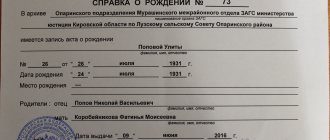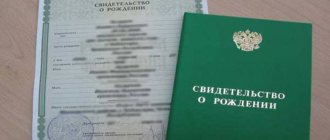Receiving a deposit in Sberbank according to a will
The owner has the right to independently dispose of his contribution in the event of death, together with other property. To do this, you need to draw up a will. This is a document that contains the owner's instructions in the event of death. It is subject to mandatory notarization.
If it is not possible to contact a notary, a citizen can have the will certified by the head physician of a hospital or nursing home, the captain of a ship, or the leader of an expedition. In an emergency, you can bring in 2 witnesses to certify the document.
The document regulates the procedure for dividing inherited property in the event of the death of the owner. The recipient of the property can be any individual or legal entity, as well as the state. The will may contain information about the division of the contribution, as well as any other property of the deceased.
To receive a deposit, you must issue a certificate of inheritance rights. To do this, you will need to enter into inheritance in the general manner.
When registering a will and a testamentary disposition for the same contribution, the date of execution matters. The property will be transferred according to a document drawn up later.
Service for searching for inherited property located in the bank accounts of the deceased
As part of the Digital Economy program, on January 21, 2021, the Federal Notary Chamber signed a cooperation agreement with Sberbank PJSC. Services have been launched and are operating to help citizens in difficult life situations:
- “Loss of a loved one” – assistance in organizing a funeral, receiving guaranteed payments, processing documents and entering into an inheritance.
- “Inheritance search” and “Inheritance without a visit” - help to quickly resolve issues related to registration of inheritance.
Another large Russian bank, VTB, will join the service.
Testamentary disposition for a deposit in Sberbank
To dispose of his contribution in the event of death, a citizen can draw up a testamentary disposition. This option saves time and money.
Important! The disposition document allows the owner of the deposit to transfer funds to a specific person. If there are several heirs, then the investor can determine the size of the share of each of them. The remaining applicants are excluded from the inheritance.
Testamentary disposition according to Art. 1128 of the Civil Code of the Russian Federation is drawn up free of charge in the credit institution in which the deposit is opened. It differs from a will in that the document is executed solely in relation to the contribution. It is impossible to provide for the disposal of other property with its help.
A will may set restrictions on the use of funds. For example, if the heir is a minor child, then his parents or guardians act in his interests. But they do not have the right to spend the minor’s funds in their own interests. To remove it, you must obtain permission from the district guardianship department.
Expert opinion
Noskov Georgy
Lawyer. Experience 12 years. Specialization: civil, family, inheritance law.
To eliminate the possibility of abuse, the testator can provide a withdrawal schedule. Also, the order may contain a clause on withdrawal of the deposit when the heir reaches 18 years of age.
If the document was executed before 2002, then the heir should not receive a certificate of inheritance rights. Funds are issued on the basis of the death certificate of the depositor.
Other questions
- For which deposits will compensation be paid in 2021?
Compensation is paid for deposits of citizens of the Russian Federation opened with Sberbank PJSC before 06/20/1991 and valid as of 06/20/1991.
- for deposits opened on June 20, 1991 and later; - for deposits closed during the period from June 20, 1991 to December 31, 1991; - for deposits for which compensation was previously fully paid.
- Who will be paid compensation in 2021?
— depositors-citizens of the Russian Federation born in 1991. inclusive; - heirs who are citizens of the Russian Federation born in 1991. inclusive of deposits of depositors who are citizens of the Russian Federation; - heirs or individuals who paid for funeral services in the event of the death of a depositor who is a citizen of the Russian Federation in 2001-2020.
- Deposit in another city. How to get compensation? On the basis of what documents is the transfer of compensation carried out? Is it a paid service to transfer the compensation amount to another structural unit of the bank?
In this case, the depositor (heir) must contact any structural unit of Sberbank PJSC and fill out the appropriate application for transfer (form 143), providing the documents necessary to receive compensation (including a savings book, if available).
When transferring the amount of compensation accrued on an existing deposit, a fee is charged in the amount determined by the Bank's tariffs for making money transfers.
When transferring compensation for a closed deposit, no commission is charged for this operation.
How to receive money from Sberbank by inheritance without a will
In the absence of administrative documents, inheritance of such property occurs in the general manner. If the account owner did not have time to sign off the property, then the contribution will be included in the inheritance along with other property.
In this situation, inheritance of the deposit will occur according to law. When receiving the property of the deceased according to the law in accordance with Art. 1142 of the Civil Code of the Russian Federation, the parents, children and spouse of the deceased investor have priority rights.
The procedure for inheritance is the same as in the case of a will. Relatives of a deceased citizen need to contact a notary. The key point is the deadline for filing papers - 6 months. If applicants do not submit documents, then relatives of the next line are called upon to inherit. This includes siblings and grandparents of the deceased subject.
After receiving the inheritance certificate, the recipients must contact the bank. Money is issued upon application. If the heir recognized the ownership of the deposit through the court, then when submitting the application it will be necessary to provide a court decision.
The concept of hereditary mass
All movable and immovable property that was owned by a citizen during his lifetime, after his death turns into the so-called inherited mass. It is she who is inherited by the relatives of the deceased or other persons who have rights to it under the will.
As for whether the savings book contribution is included in the property under the will, it all depends on whether the testator drew up this document and whether he included bank savings in the list of inheritance.
Procedure for receiving a deposit from a deceased relative in Sberbank
Procedure for receiving a deposit:
- Contacting a notary.
- Search for contributions.
- Registration of a certificate of inheritance rights.
- Receiving funds from Sberbank.
Important! The amount does not exceed 100,000 rubles. heirs can withdraw from the deposit without a certificate of inheritance rights in order to organize the funeral of the depositor.
Contacting a notary
The testator has the right to assign his property to any person. Having a will greatly simplifies the procedure for registering an inheritance. However, withdrawal of funds from a bank account is preceded by registration of documents with a notary.
An inheritance case is opened upon the application of the heir. Documents are submitted at the place of registration of the deceased citizen.
List of documents for registration of inheritance in the form of a deposit
| No. | Title of the document |
| 1 | Civil passport of the heir |
| 2 | Original testamentary disposition or will |
| 3 | Owner's death certificate |
| 4 | Agreement with the bank (if any) |
| 5 | Passbook (if available) |
| 6 | Certificate about the last place of registration of the deceased |
After the expiration of the deadline ( 6 months ) for accepting the inheritance, the recipient is issued a certificate.
Important! The state duty when registering an inheritance in this case is not withheld (Article 333.38 of the Tax Code of the Russian Federation). Other services (request to search for a deposit) of a notary are paid by the heirs in full.
Sample application for inheritance
Search for contributions
A testamentary disposition and a will are documents confirming the presence of money in the bank. Quite often, citizens are unaware of the existence of deposits registered in the name of deceased relatives.
Important! If the recipients of the deceased's property do not know about the presence of the deposit, then the bank is not obliged to look for them. The unreceived contribution becomes the property of the state.
If the testator did not leave behind a will or did not transfer the document to the heir for any reason, then finding the bank in which the money is located becomes somewhat more complicated. The key document is the bank deposit agreement or passbook.
They display information about the presence of a deposit, the amount of funds and the name of a specific bank. Usually such documents are kept at home. Therefore, it is necessary to look through the personal belongings of the deceased.
The heir can make a request to Sberbank independently. Below is a sample application for seeking a deposit:
Application for the issuance of money
After receiving the inheritance certificate, the applicant will need to contact the bank. To withdraw money from your account, you must write an application. There is usually a sample included in the jar.
The heir must have with him:
- passport of a citizen of the Russian Federation;
- death certificate of the investor;
- a document confirming the heir's rights to the deposit;
- agreement or passbook.
A bank employee will identify the applicant and check the documents provided. If there are no comments to the heir, then he will be given a date to receive the money. If desired, the recipient can re-register the contract in his name without withdrawing money.
In some cases, a document confirming the citizenship of the testator may be required. Among them:
- Extract from the house register. The document confirms not only the place of residence of the testator, but also contains records of registration/extract as of 1991.
- USSR passport insert.
- Certificate from the Federal Migration Service.
If the specified documents are available, the heirs can receive deposits opened by the testator back in 1991. Heirs born between 1946 and 1991 can expect a doubling of the balance. Persons born after 1991 are not entitled to monetary compensation.
Terms and rules of use
Receiving funds from an inheritance is a long process - more than six months must pass from the date of death before the accounts are transferred to the new owner.
When the heir receives all the rights, he can use the funds at his discretion. Documentedly, the bank deposit is transferred to another person - you can manage it at your own discretion: withdraw or leave the amount at interest.
After six months after submitting the application and certified documents, the heir must return to the bank in the same package to re-register the account.
Sberbank also pays compensation for deposits of other banks. Read the information on the official website sberbank.ru. When receiving accounts as an inheritance, you can request compensation for the deposits of bankrupt and closed banks that are on the list. If this issue does not interest you, due to the small amount, refuse to inherit this contribution.
Who is entitled to the obligatory share?
When drawing up a will, the testator must take into account the interests of socially vulnerable persons. A similar rule applies to a testamentary disposition, which is drawn up in the bank where the deposit is located.
Mandatory heirs include:
- disabled children/parents;
- disabled spouse/dependents.
These citizens are entitled to at least half of the share that they could count on by law. If the will does not take into account their interests, then the notary is obliged to take the necessary actions to allocate a share of the property. The contents of the will are not important. If a dispute arises between the heirs, it is resolved in court.
Reducing the share of the inheritance or refusing to award it is permitted only by a court decision. The initiator of the legal proceedings is usually the heir, whose rights are significantly limited in the event of the allocation of a mandatory share to the applicant.
Waiver of the obligatory share in accordance with Art. 1149 of the Civil Code of the Russian Federation is drawn up in writing and submitted to a notary.
Payment
When leaving a will with a notary, a fee is charged. It consists of three parts:
- state duty. This part is established by law.
- Bribe for the “legal and technical part”. Installed by a notary.
- Additional payments for urgency, work on weekends, on-site compilation. Usually in the form of a coefficient (one and a half to two times).
The state fee for drawing up a will or for accepting a sealed envelope with a will is 100 rubles. This is a smaller portion of what the compiler will pay.
Exact notary prices can be found on the website of the region’s notary chamber. The approximate cost, taking into account the state duty, will be from 1.5 to 2 thousand rubles. It does not depend on the amount of funds on the deposit.
When drawing up a testamentary disposition in a bank, as mentioned above, no fee is charged .
Marital share
If the testator was married at the time of opening the deposit, then such property is the common property of the spouses. Therefore, after the death of one, half of the property belongs to the living spouse.
Allocation of the marital share in accordance with Art. 1150 of the Civil Code of the Russian Federation occurs at the request of the husband/wife. Documents are submitted to the notary within 6 months. Missing deadlines can result in lengthy legal proceedings.
Important! Having received ½ of the contribution as a spousal share, the spouse has the right to claim the share as an heir.
Notarised power of attorney
It happens that the owner of the savings book himself draws up a specific notarized power of attorney, where he indicates a specific person as the recipient. After which he can theoretically go into the bank and present an order. It is not necessary to wait a month or six months, or even to inform managers about the death of the owner of the passbook. A special case when another person freely disposes of funds.
A notarized power of attorney is an effective means by which a relative is entitled to payment of any amount specified by him. He can completely empty the passbook and close it even without the presence or written consent of the deceased.
The truth is that this is a risky step, because any notarized power of attorney will instantly lose all its power as soon as the bank learns about the death of the person who wrote it. This is the law. It is worth remembering that the bank is obliged to temporarily freeze all accounts and deposits of the deceased. The period is also determined by law - 6 months. The bank card of the deceased is also blocked. This is the time when bank specialists check the data. The end date of the verification is communicated to the heirs.
Closing the lost passbook of the deceased
It happens when relatives only know the fact that the deceased has a savings account. However, the book itself is not there. Does this make it difficult for heirs to receive payments? Not particularly. They need to immediately notify the notary, who is obliged to assist the applicant.
Another option is to first consult with a specialist at the desired bank where the deceased was previously served.








![How to get a mortgage for new buildings in Sberbank in [year]](https://notarius-nn.ru/wp-content/uploads/kak-poluchit-ipoteku-na-novostrojki-v-sberbanke-v-year-godu-330x140.jpg)
